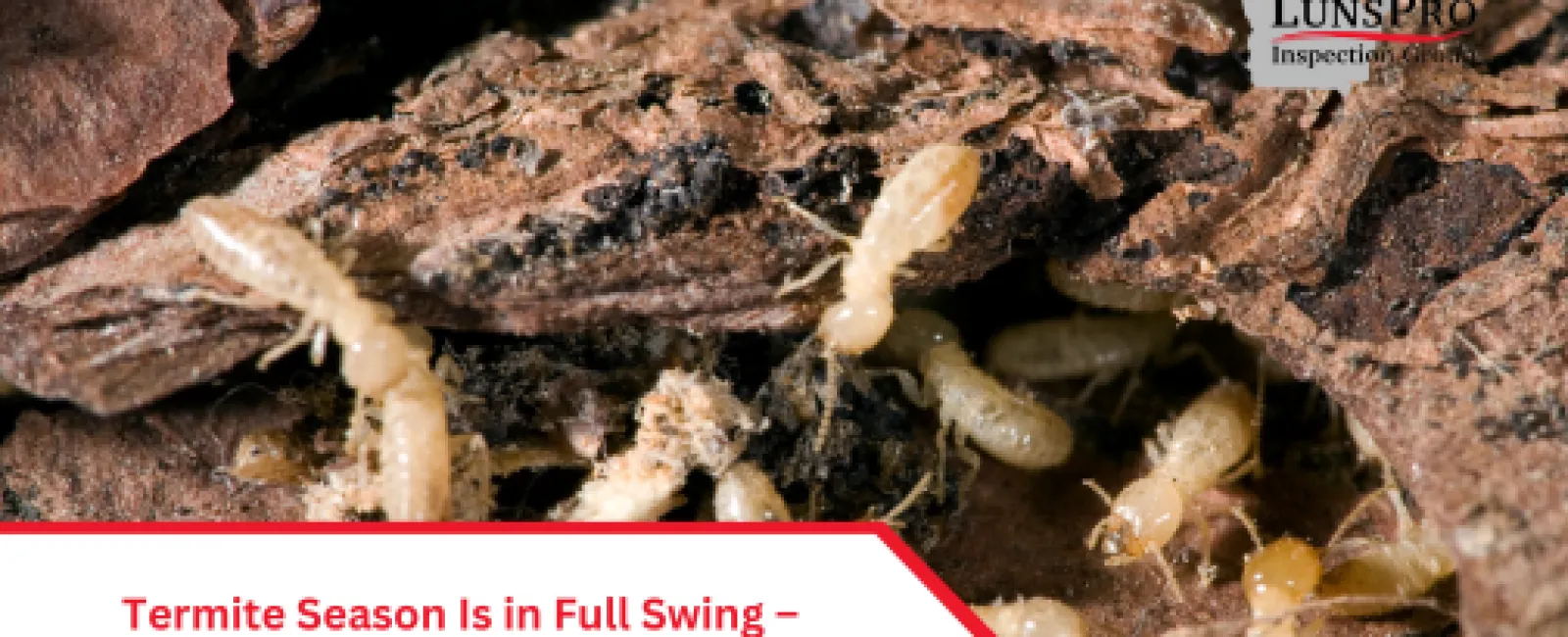When warm weather arrives in Georgia, so do termites—and they don't waste time getting to work. For homeowners and property owners in the Metro Areas, termite season is not just a seasonal nuisance—it's a real and costly threat. These silent invaders can cause thousands of dollars in structural damage before any visible signs appear. From Atlanta to Alpharetta to Athens, understanding how termites operate and how to stop them is essential for protecting your property investment.
At LunsPro Inspection Group, we've seen firsthand the devastating effects of untreated infestations across both residential and commercial buildings. Whether you're dealing with an older home on a crawl space or a newer build with treated lumber, no structure is completely immune. This article will give you the insights you need to detect early warning signs, apply preventative strategies, and understand when it's time to bring in the professionals for a comprehensive termite inspection.
When Does Termite Season Start and End in Georgia?
In Georgia, termite season typically kicks off in early spring—around March—and can extend into late October, depending on weather conditions. The peak swarming period for subterranean termites, which are the most common type in this region, usually occurs from April through June. These months are marked by humid conditions and frequent rain—ideal breeding and swarming environments for termites.
During this time, winged termites (called swarmers or alates) emerge from mature colonies in search of a mate and a new location to start a colony. Homeowners in Atlanta, Alpharetta, and Athens often spot these swarmers near windows, light fixtures, or on patios. Seeing a swarm is a major red flag, not just for an active colony but also for structural vulnerability.
Common Types of Termites in Georgia
Understanding the termite species most active in Georgia can help homeowners better assess their risks and tailor their prevention strategies.
Eastern Subterranean Termites
Most widespread and destructive
Build colonies underground and travel through mud tubes to access wood
Thrive in moist soil and damp wood
Cause extensive structural damage, often undetected for years
Formosan Subterranean Termites
Less common but extremely aggressive
Can chew through wood, foam insulation boards, and even thin sheets of metal
Form massive colonies that can cause rapid structural damage
Have been increasingly reported in parts of Georgia due to warmer winters
Although drywood termites are more common in the southernmost parts of the U.S., they can occasionally be brought into homes via infested furniture or wood products. However, subterranean termites remain the top concern for Georgia home inspections.
How Termites Damage Structures
Termites feed on cellulose, the main component found in wood and other plant-based materials. Over time, their colonies can grow into the millions, silently consuming structural components from the inside out. The damage is often not immediately visible because termites typically start deep within the wood or behind walls, floors, and foundations.
Here's how termites can impact your property:
Weaken floor joists and support beams, leading to uneven or sagging floors
Damage wall studs, making walls bow or crack
Compromise roofing structures, especially around fascia and soffits
Cause foundation instability, particularly in crawl space or pier-and-beam foundations
In commercial structures, termites can damage support columns, subflooring, and HVAC infrastructure. Our Atlanta, Alpharetta, and Athens Residential and Commercial Inspections frequently uncover hidden termite issues that business owners didn't know existed until extensive repairs were necessary.
Signs of an Active Termite Infestation
Termites are known as "silent destroyers" for a reason. But with careful observation, there are several warning signs that may indicate an active infestation:
Mud tubes: Pencil-sized tunnels on foundation walls, crawl spaces, or basement walls
Discarded wings: Often found near light fixtures, windowsills, or baseboards
Hollow-sounding wood: Especially along baseboards, door frames, or attic joists
Bubbling or peeling paint: Similar to water damage, but often caused by termites behind the surface
Buckling or warped floors: May mimic water damage but caused by internal wood damage
Live swarmers or worker termites: Usually pale or creamy in color, visibly crawling inside wood or soil
If you see any of these signs, contact a professional for a Georgia home inspection immediately. Early detection is key to avoiding structural compromise.
Prevention Tips for Homeowners in Georgia
Preventing a termite infestation requires a combination of good construction practices, moisture control, and routine inspections. Here are some practical steps to minimize risk:
1. Eliminate Moisture Sources
Fix leaking faucets, pipes, and A/C units
Ensure downspouts and gutters direct water away from your foundation
Use vapor barriers in crawl spaces
Keep vents clear and functioning properly
2. Manage Landscaping Wisely
Keep mulch and wood debris at least 12 inches from the home's exterior
Trim bushes and trees so they don't touch siding or roofing
Remove dead stumps or roots near your home
3. Structural and Access Protection
Seal cracks and gaps in the foundation and walls
Repair damaged roof shingles and flashing
Install termite shields on foundation piers and crawl space supports
Avoid wood-to-soil contact wherever possible
4. Schedule Regular Professional Inspections
Annual inspections from a trusted provider like LunsPro Inspection Group are critical. We conduct comprehensive Atlanta, Alpharetta, and Athens Residential and Commercial Inspections that check for early termite activity, moisture conditions, and structural vulnerabilities.
Why Professional Termite Inspections Matter
DIY termite control methods are rarely effective for anything beyond surface treatment. A professional inspection provides a detailed assessment of both the interior and exterior conditions of your property.
At LunsPro Inspection Group, our trained professionals use:
Infrared thermal imaging to detect hidden moisture
Probing tools to test wood integrity
Moisture meters to identify high-risk zones
Drone inspections, when needed, for elevated or hard-to-reach areas
This multifaceted approach ensures nothing is missed. Our services are customized to address the specific climate and construction practices found in the Atlanta, Alpharetta, and Athens Areas, making us a go-to provider for Georgia home inspections during termite season and beyond.
Termites are more than a seasonal nuisance—they are a structural threat that can quietly eat away at your investment. Georgia's warm, humid climate makes it a hotspot for termite activity, especially from spring through fall. Whether you live in Atlanta, Alpharetta, or Athens, being proactive is essential. Knowing the signs of infestation, taking preventative action, and scheduling regular inspections are your best defenses.
At LunsPro Inspection Group, we specialize in helping property owners protect their investments through expert inspections tailored to regional challenges. From high-risk crawl spaces in Alpharetta to multi-story structures in Atlanta, our team provides comprehensive assessments that keep homes and businesses safe. Don't wait until the damage is done—invest in peace of mind with a termite inspection today.
LunsPro's Atlanta, Alpharetta, and Athens Residential and Commercial Inspections are trusted throughout Georgia. As termite season continues in full swing, there's never been a better time to schedule your Georgia home inspection and take the steps necessary to protect your property long-term.

